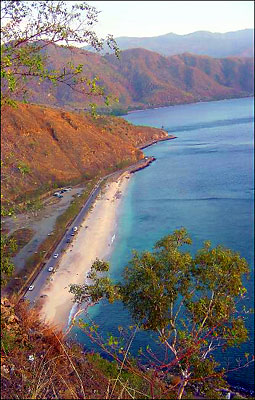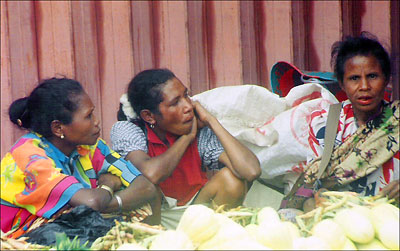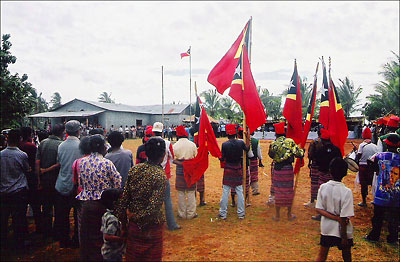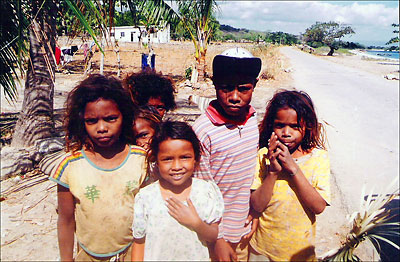
The view from the foho (mountain) toward Dili. This is the north side of the island; the interior is entirely mountainous, one of the reasons for the triumph of the resistance army over the invaders. (Mark Majalca)
You go somewhere, you want a connection. That’s why McDonald’s and Alcoholics Anonymous meetings are so popular in strange lands — an instant fellowship, a slow letting out of a frightened breath held. And yet for so long, in East Timor, there was no connection for me.
On Sundays — the only day I don’t work — I’d walk the five miles to the statue of Cristo Rei, past the lagoon filled with pig shit and the Portuguese soldiers drinking at Sagres Beach, and I’d say to myself, Keep breathing. Do what is familiar. Find what is familiar. What do you see?
I’d begin the list: Animals loose in the road. Kids staring at me. The oppressive heat hanging like a net. Potholes. Deteriorating stucco houses with peeling pale limestone paint. Lizards. Garbage. Shit. And still I did not feel I could connect this place with anywhere, or anyone, I had ever been.
Oh, sure, there were ghosts. I knew that. I knew they had to be everywhere. I’d run along the water’s edge before the United Nations workers woke up, miles of white broken coral glowing in the early morning light, and try not to imagine what I couldn’t help imagining — that the whole shore was nothing but a beach of bones.
I live at a place called the Hotel Turismo. It’s not very turismo really — all moss-covered stucco and stone — unlike most of the other hotels here, the Dili 2001, the Timor Lodge, that are made from cargo containers. Hotel life in East Timor is but a few years old. Big ships arrived one day and offloaded empty cargo containers. The containers filled the vacant craters in downtown Dili where colonial Portuguese mansions had been and became … the ministry of justice, the health department, embassies. And hotels.
The hotels are apartments really, because the U.N. civilian police and a zillion other do-good groups need housing for a year, two years. Others only stay a week or two. They’re contracted, on loan from the parent agency somewhere in Europe or San Francisco. Oxfam. Asia Foundation. World Bank. Commission on Truth and Reconciliation. Consultants. They stay at the hotel; we see them sometimes at the Turismo, and then one day — poof! — they’re gone. But the agency has rented the room permanently. The people are transient; the service, or the idea of the service, is not.

Market sellers in Maubisse, one of the larger cities. Maubisse means “iron man” in Tetun; the name comes from the mountain‘s supposed properties that give the people their extraordinary strength and fortitude.
The tiny island sags under the weight of its peacekeeping force. The white Land Rovers and troop carriers with the big black U.N. decals rumble by from dawn to dusk, making it impossible to run on the quiet white coral bone beach, impossible to feel you belong here, are loved here. You are hated here.
There are too many of us, each truck a different country. There is an Irish PKF, a Thai PKF, a Fijian PKF. The Fijians are the most respected. They go into the bush to find the thugs who are beginning to resurface on this side of the border. Groups of nine, they are drawn to their old homes, but they are bad, bad men in a land with no word for ‘bad.’
There are Portuguese and Brazilian and Japanese and Turkish and Malaysian and Pakistani and Korean and Chinese and Mozambiquan and Nigerian and British and Spanish and Russian and even Bosnian police. They have turned the capital city into a nightclub — a false cosmopolitan Mecca, and there are things in stores like Lipton instant rice mix and granola bars and Gatorade and condoms and Tampax and plastic shower organizers.
There are some old buildings standing, of course, but most have been ravaged and firebombed. First in 1975, when Portugal fell, losing its colony of 400 years, and the world gave tacit approval to Indonesia to take on the role of overlord, and then again, 24 years later, by the Indonesian army and those desperate Timorese they commandeered into destroying each other.
The colonial beauty of these public offices and private sprawling villas is made all the more delicate and majestic by the twisted girders where roofs had been, the haloes of soot where explosions burst through the windows. The best ones have been appropriated by those who finally drove Indonesia out or at least underground, and converted into living quarters for visiting dignitaries needing to be entertained, official representatives needing home-country amenities. The international community spends a hundred and twenty thousand dollars per house to showcase development organizations advocating for a free economy in which the living wage is three dollars a day. But who’s to say East Timor is any different from Kosovo, from Mozambique, from Angola and Darfur in that respect? Who’s to say that a peacekeeping force isn’t just an invading force that doesn’t kill you?
But what do I know?
Not much.
About anything, or anywhere.
Except about the Hotel Turismo, which is old and genteel in a crusty, decaying way, with gardens at its center and goldfish pools and narrow upper corridors leading to railings that drop off into the black unknown. It is a labyrinth of metal and dark vines and dripping ceramic spouts. Journalists stayed here in 1999, to monitor the elections. Most left soon after, when the killing started again.

In 2003, the Prime Minister and his cabinet visited outlying villages to bring the “town meeting” to remote locales and give local leaders a chance to report on their communities’ needs. Due to the different languages spoken in the mountains, the results of this initiative were mixed. The East Timor flag symbolizes the mountains, blood, the sun, and peace.
In every documentary of that sad time, there’s footage of this hotel — famous now, really — with scattered gunfire sounding from next door. There’s no sleeping at night even now because the ghosts run down the tiled corridors trying to escape the bullets — over the fence and into the yard of another stucco former mansion, now called Timor Aid, where 2,000 people hid after the referendum in 1999, when the United Nations said it was pulling out since there was nothing else to accomplish.
The entire country — people, animals, coral reefs, bridges — was threatened with annihilation by Jakarta if it voted for independence. Independence was on the table because the Timorese Falantil resistance had smuggled out a bookish, gawky young soldier who’d landed in New York, picked up English and a cheap suit, and for 24 years hounded the United Nations until it listened. On that day in that tiny country in 1999, over 90 percent of the voting population climbed down out of the foho, the mountains, and into the cities and voted almost to a person for independence, marking X’s on ballots and knowing they would be killed for it. The films of that September show ancient men and women behind the wall of Timor Aid, grabbing at the knees of U.N. election officials, begging them to stay. Some did. But most did not. And the Timorese were slaughtered.
I am here in East Timor three years later and I dread making a friend, even if it were possible. After all, how do you get past the part where you say, “I’m so sorry,” and you need to say that to everyone, every day, because you know that 80 percent of everybody’s family died three years ago? You’re here as a “development professional” and you are trying to “help” and your assistant or driver or interpreter is Timorese, and how stupid is it to ask every morning, “So, how are you today?”
The East Timorese do not have a phrase in Tetun for ‘How are you?’ They also do not much go in for ‘I hope,’ as in “I hope to see you soon.” They do not say, “I believe.” They do not say, “Good luck.” Rather, they say, “Okay, or not?” They say, “I might see you soon.” They say, “I feel.” They say, “Fight.”
Every day here, I feel like more and more of an asshole.
There’s no word for that either. Surprisingly.
And there’s no word for ‘bad,’ as in “bad person.” A bad thing can happen but no man or woman is bad.
I cry a lot here.
How are you today?
Okay, or not?

A salt seller’s kids on the road to Metinaro, about two hours east of Dili.
Two streets up and over, at the Tropical Hotel, the ghosts are worse. That’s one of the places where the pro-integration forces carried out their torture. One of the places. And Tasi Tolu, Three Lakes, a level park outside of Dili where the Pope visited in 1989, and anti-occupation banners were pulled out from under shirts to show the international cameramen. Later, as a warning, the Indonesian militia mowed down 200 people, then threw their bodies in the shallow lakes. More ghosts.
Santa Cruz, the massacre at the walled cemetery in 1991. 250 people killed at a memorial service for a pro-independence fighter. For honoring the dead. My young interpreter Luis tells me, as casually as he can but looking away, and so quietly I can hardly hear, “I slept with a corpse once. My cousin. He was in Santa Cruz that day. My mother told me not to leave him until the family could come for him. So I didn’t leave him.”
No connections to anything. I just wander and cry, and try to do some of the things for which I was hired.
I was hired to train Peace Corps volunteers. My first job is to find families outside of Dili, the capital, for the volunteers to stay with. The villagers are shy and warm and have no idea why foreigners would like to stay with them. The Timorese do have a word for ‘foreigner.’ It is Malae, after the Malaysians who were the first foreigners here years ago: successful, pushy, relentless. Now, a Timorese who makes any money at all is called Malae.
My village families have three-room houses and live 14 to a house, no latrine. So I’m building latrines. I go around with a Toyota Hilux 4×4 and Luis — he’s an ex-priest who helped refugees get back across the border from Dutch-occupied West Timor in 1999 — and ask families if we can build latrines for the Malae who will stay with them. They smile and say, “Sure, go ahead. We’ll even dig the hole.”
They think I am insane.
I find a nonprofit — CARE — that is teaching people how to build latrines and seek out the director.
“Where do they go now, if there are no latrines?” I ask, having looked in the dirt backyards, the undergrowth, the beachfronts, expecting to see shit stretching to the horizon.
“The pig shed,” says the director. He’s from India and he smiles. He loves that he gets to tell me, “The pigs have to eat, too.”
Nothing familiar.
And then one day my past catches up with this place.
When I was younger, I hung around Manhattan, where my sister lived, because I missed her and because I was fascinated by the Beat poets, even though most of them were gone by then. But you could feel their ghosts all over town, and they got in my way back then, living 30 years behind me when anything seemed possible. Maryan and I still saw Allen Ginsberg from time to time. She lived on MacDougal Street, and he was still there, still real, when nearly all the others were dead.
I read everything they wrote — the poems, the half-finished scripts, the love letters, the drunken musings on cocktail napkins now preserved in Special Collections at libraries with climate-controlled vaults — until I felt I was one of them. I knew that if only the time were right and the planets aligned, I could walk down Minetta Lane — their old back-from-the-clubs shortcut and the street between my sister’s apartment and Bleecker Street — and I’d see Jack Kerouac’s ghost. And I’d be given the sign, the signal, that I had a right to be here, that they knew me, that they would not begrudge me this space at least, this tiny piece of asphalt, this glimpse of grace.
Every chance I got I’d walk down skinny Minetta Lane and check it up and down, for Jack or Neil, or maybe Jackson or Joyce or Bill or Diane, skittering up, smoking and drunk and loud, oblivious to me, to the overhanging yards perched on the tall walls lining the alley, to the hour, to who they were and what they might mean or represent. I looked for them every time. I strained to hear their voices, weaving and tiptoeing up Minetta Lane in fading night and next day dawning. Because this is what I thought in those days: that when ghosts got to be ghosts, they somehow made peace with the world. What did I know then about ghosts? About peace?
So I was sure I would see them — that it had to happen. But something else happened instead. How long ago was it? 1986, maybe? Earlier? I was, what, 25?
I was padding down Minetta Lane, though it was barely dawn … when I saw my ghost walking towards me in the light of the antique lamps that line the lane. He wasn’t on the sidewalk but angling toward it, a little unsteady and deliberate, a little drunk maybe, and I felt no fear, because it was time, dammit, for someone to be one of them, for this real shadow to give me something. As he came closer, I saw he had on a sport coat, not too fashionable, and dark pants, and in the shadowy folds of his jacket was more darkness and I thought as I stared that I could see a soft, dark heart.
His hair, still in silhouette, was kind of too much, too wild — I could see it frizzy and curly in the lamplight and I didn’t want to see his face. A dark, dark face — no, it was a beard — dark eyes, shadows covering who this ghost was, so he could become whoever I needed him to be. He cocked his head towards me — he had seen me walking, seen me slow down, somehow knew I wasn’t frightened and that I wanted to prolong the moment — and he stopped, just a second, a half-second, to sniff, it seemed. He sniffed the air around him, we were four feet from each other. He saw me smiling, he smiled back, he had a beautiful smile, he looked nothing like Jack or Neal or Alan. He looked mostly like what I thought he was — a half-drunk businessman on his way home up Minetta Lane, stopping just that half-second, a past instinct, of danger long gone — a jerk of his head my way with an eyebrow up to see if he recognized me, an amused look when he didn’t.
“I thought you might be Jack Kerouac,” I said.
“Jack . . . who is that?” His voice low, with a catch in it, as if he hadn’t spoken in a while. Three words and I knew he came from far away. He’s no one, I said to myself. It’s alright, he’s no one.
“It’s okay,” I said. “He’s just a dead writer. I thought you might be him.” In a sport coat badly cut and shiny with age. A black shirt underneath, looking impossibly soft. Hands in pockets, a halo of yellow streetlight.
As we nearly crossed each other, he said, “I was, well, I didn’t know. Who you might be. But now I see you. That’s better.”
And he grinned again. He didn’t seem that drunk now. Maybe a little. And so, a little afraid of getting rolled. Because I’m a big girl, with big arms, out alone in the alley, so who knows what he thought.
“Don’t worry,” I said.
“All right,” he said.
Oh, clever, clever me. I thought they all loved me, even the ghosts.
And like other memories before, it buried itself, like a little shore animal until years later. Out of desperation to know something, anything, about this new, sad place I am living in, I go to a USAID worker’s house, a woman with a collection of documentaries about East Timor, the war, the occupation. Some in Tetun, some in Bahasa, a few in English. And she is showing a film called Scenes from an Occupation, and there is the government building in Dili, and there is Hotel Turismo, and there is his face, the face of my past on Minetta Lane, the jaunty ghost.
He has won a Nobel Prize for his country. His name is José Ramos Horta, the foreign minister. He was the young soldier sent to New York to convince the United Nations to recognize that East Timor was filled with brave, proud people who would give their lives for independence. In the film, he is in his bowtie and sport jacket clomping around the United Nations, around SoHo, and years earlier, on the waterfront street of Dili by the port, leaning against a truck dressed in fatigues, in a halo of gunfire smoke and with a voice like gravel thrown against plate glass. And I wonder, Did I need to see this to believe that it was all right for me to be here?
And sooner or later, because the world is so small, so tiny, really, I know I will have to see him again, and he will not recognize me, and I will have to let that be okay, because we did not figure into each other’s lives. He was a ghost of someone I did not know, and I was some brief apparition, some trick of the streetlight, that he had to be careful of back then, and forget, and keep going.
May 2002
- Follow us on Twitter: @inthefray
- Comment on stories or like us on Facebook
- Subscribe to our free email newsletter
- Send us your writing, photography, or artwork
- Republish our Creative Commons-licensed content

